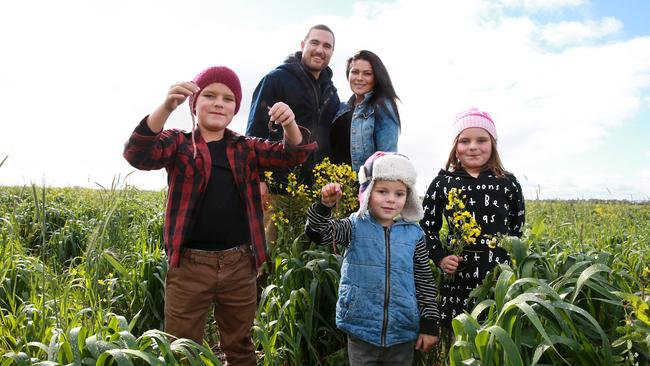Wet winter puts Grant and Naomi Sims farming system to the test at Pine Grove near Echuca
IT’S in the really dry or really wet years that things stand out, The Weekly Times Coles 2015 Farmer of the Year Grant Sims says.

IT’S in the really dry or really wet years that things stand out, Grant Sims says.
The Weekly Times Coles 2015 Farmer of the Year, who runs a no-till cropping enterprise at Pine Grove in northern Victoria with his wife, Naomi, and parents, Ken and Wendy, has had plenty to capture his attention this season.
“It’s certainly wet,” he said. “But I’d rather it too wet than too dry.”
With soil health the central pivot around which the Sims’ operation revolves, Grant says it has been interesting to see how the farm has performed after receiving 284mm of rain so far this year.
The Sims have been on a 100 per cent controlled traffic system for the past two years and partial controlled traffic for eight years before that.
It allows them to move their machinery around the paddocks on compacted tracks, leaving the growing area to “come alive” under their biodynamic approach to farming.
The tracks have been standing up well but with good rain falling almost every week of winter so far, Grant has been considering aerial spraying to catch up on broadleaf treatments for weeds, and applications of liquid fertiliser and trace elements.
To improve soil biology, the Sims use no insecticides or fungicides, instead relying on natural control methods such as beneficial species or by avoiding the problems in the first place through system improvements.
Grant says this approach, combined with plenty of residue left on the ground and the use of deep-rooted cover crops to break up compacted clay soil, has led to a clear improvement in their soil’s capacity to absorb water.
“We’re finding in paddocks where we have controlled traffic and where we’ve been improving the soil through stubble retention, liquid fertilisers and other things, that we’ve got no signs of moisture stress,” he said.
“It’s looking really good.
“In areas that are still compacted, the crops are sitting in water and are starting to suffer.
“The paddocks with the healthier soil have shown up to handle the wetter conditions a lot better.”
DASH FOR CASH
ACROSS the 4000ha they have sown this year, the Sims have 10 potential “cash” crops in their rotation.
Wheat, barley and milling oats are their main source of income but they have also planted faba beans, chickpeas, vetch, cereal rye, canola, sunflowers and “peaola” (a mix of field peas and canola) as companion crops.
They have 200ha under cover crops that comprise a mix of tillage radishes with their long tap roots, field peas and whatever else Grant feels a paddock needs at the time.
Because of the nature of the season, decisions are yet to be made on whether some of the companions will be harvested together, or, like the radishes, desiccated in spring to help control weeds and provide nutrient-rich compost that will feed later crops.
“I’m not in a hurry to spray the radish because they’re helping in this wet,” Grant said.
“Putting that tap root down creates channels for drainage and roots to follow.”
One of the biggest changes on the property this year has been the introduction of cattle into the system.
FOREIGN AFFAIRS
AFTER travelling to the US in February to see what was being recommended there by leaders in the no-till movement, Grant decided to trial the agistment of 50 beef cattle at the end of summer.
The cattle were moved across four 15ha paddocks of irrigated cover crops, spending just a week in each to avoid compaction issues that can be associated with set stocking.
“We have seen some awesome benefits from that in terms soil health and biology,” Grant said.
“After we grazed it, we sprayed it out and sowed it to wheat or faba beans, depending on what each paddock needed.
“One of the most obvious signs of soil health improvement is worms and the worm activity we have in those paddocks now has blown me away.
“It’s been a real light-bulb moment.
“At one stage I found probably 60 to 100 worms under one cow pat. If you can get worms out there working for you, they do a lot of heavy lifting.”
One of the tests for the system this year has been a large outbreak of lucerne flea in an oat crop, which Grant successfully treated by lifting the health of the plants rather than applying an insecticide.
“There was about 30 or 40ha that was nearly white with insects swarming on the plants,” Grant said.
“In other years we might have just gone out and nuked it. I went out with some liquid calcium and put some Cropsure (liquid fertiliser) on it as well to lift the sugars in the plants.
“Two weeks later they were still there but the numbers were down and the plants looked like they were coming back. Now it’s probably the best paddock on the whole farm.
“It’s exciting to see.”
BUG OFF
GRANT has used the technique on insect infestations in faba beans as well with similar results.
After dry finishes for the past two years, the Sims are looking forward to the prospect of a wet spring, which is being forecast.
“That’s going to be interesting,” Grant said. “As the days get longer and sunnier it will be good.
“If it stays wet we will probably look at planting some dryland summer crops after we have sprayed out the covers.
“It will be really good for the soil, which at the end of the day is the most important thing. “It will pay off in the long run.”
• The Weekly Times Coles 2016 Farmer of the Year awards nominations are now open.


